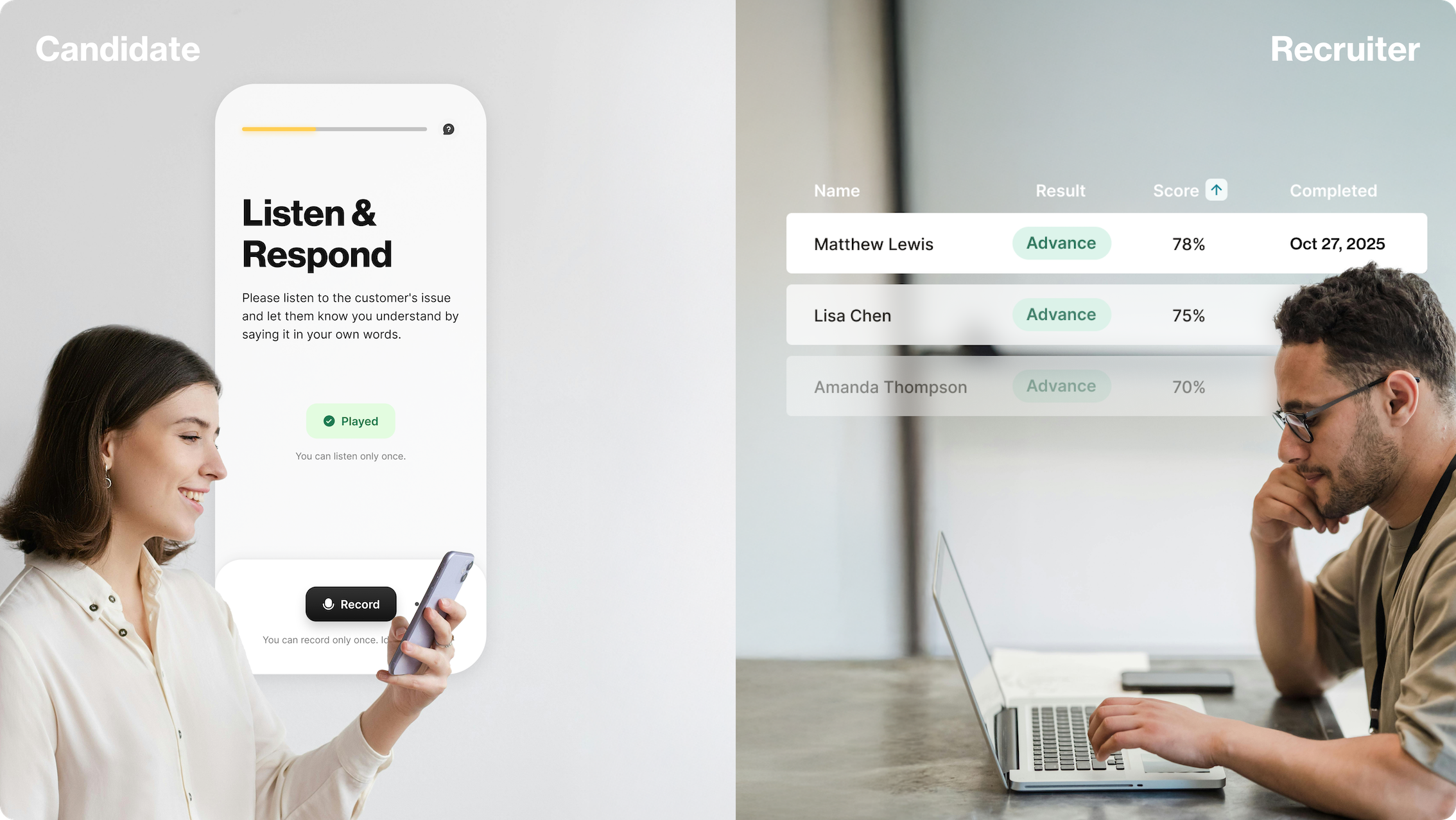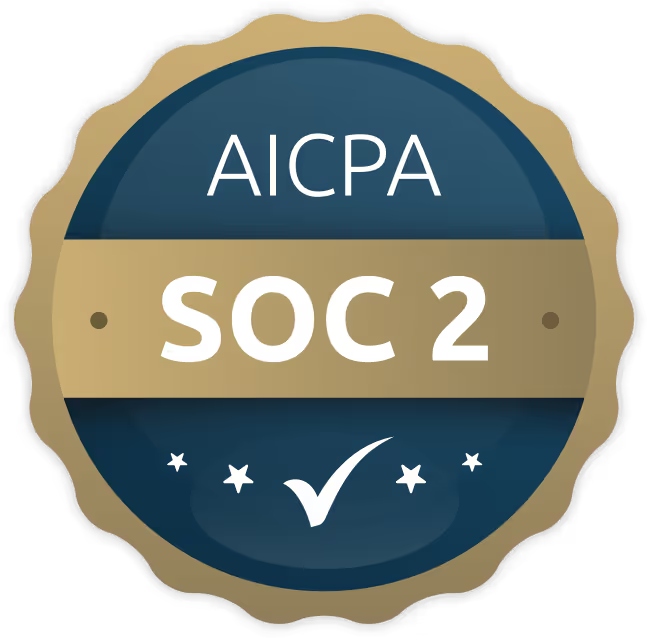
Hiring for call centers shouldn’t feel like a game of chance. But for many recruiters, sifting through resumes and generic test results often leaves them wondering: “Can this person actually do the job?”
Meanwhile, candidates are frustrated by outdated processes that don’t let them showcase their real skills.
Understanding modern call center assessment tests helps bridge the gap between what recruiters need to see and what candidates can demonstrate.
In this post, you’ll learn what to expect during a call center assessment test. Plus, how the right ones simplify hiring, give recruiters confidence in their choices, and allow candidates a real chance to shine.
What Is a Call Center Assessment Test?
A call center assessment test checks if someone has the skills to succeed in a call center job. There are multiple formats and each evaluates role-specific abilities or personality traits (e.g., great communication, problem-solving, and an upbeat attitude). While candidates can guess the correct answer to generic multiple-choice online tests and cheat, the above open-ended simulation shows how they would handle real-life scenarios.
Such assessments are a far more worthwhile investment for recruiters, offering a fairer, more accurate picture of candidates’ skills.
Candidate assessments come in many forms to test different abilities:
- Situational judgment tests present candidates with realistic scenarios to evaluate decision-making and problem-solving skills
- Personality tests measure a candidate’s personality traits (e.g., empathy, adaptability, and resilience) to determine suitability for frontline customer service roles
- Aptitude tests evaluate specific abilities like numerical and verbal reasoning or technical skills required for the role
- Multitasking exercises test a candidate’s time management and the ability to handle several tasks simultaneously (e.g., talking while entering data)
- Language tests assess proficiency in the language(s) required for the job, alongside grammar, vocabulary, and communication fluency
- Voice assessments evaluate clarity, tone, and accent to ensure candidates can communicate effectively over the phone
- Cognitive ability tests measure information processing, reasoning, and memory to gauge overall mental agility
However, the best pre-employment assessments combine all the important stuff—critical thinking, communication skills, and language ability—into one. It makes life easier for recruiters and less stressful for candidates (because who really likes taking seven tests back-to-back?).
These all-in-one tests also align with today’s hiring trends (e.g., focusing on skills over resumes and using artificial intelligence to make recruiting faster and fairer). Plus, they help hiring teams find the right fit while allowing candidates to prove what they can do.
Why Are Call Center Assessment Tests Better for Candidates and Recruiters?
Hiring decisions should feel like thoughtful matches, not random guessing games. The best call center assessment tests offer a data-driven, objective process that balances soft skills with role requirements—something traditional methods often overlook.
Let’s dive into the benefits of effective, valuable call center assessment tests for both candidates and recruiters.
The Benefits for Candidates
Skills-based tests level the playing field by highlighting what candidates can do, not just where they’ve studied. Plus, they’re structured to reduce unnecessary pressure. Instead of focusing on resumes, applicants prove their natural abilities by simulating job-specific tasks. It’s no wonder many candidates prefer this streamlined assessment experience.
Here are three of the main benefits of pre-hiring assessments for call center candidates:
- They give people without a “perfect resume” the opportunity to shine by focusing on their support skills rather than where they’ve worked or what degree they have
- Instead of worrying about perfectly listing qualifications, candidates can showcase their performance in real-world scenarios
- It’s much easier for job-seekers to feel confident about role suitability by proving they can answer customer inquiries or calm down upset callers
When 70% of applicants have considered dropping out of recruitment processes, call center managers can only benefit from implementing more candidate-friendly hiring processes (like assessments).
The Benefits for Recruiters
Call center assessment tests are a huge time-saver. It’s one thing to read “excellent communicator” on a resume; it’s another to hear how someone navigates a difficult call or troubleshoots a problem.
Here are four main advantages of skill assessments for recruiters:
- When hiring teams are dealing with hundreds (or thousands) of applicants, these tools can quickly identify the best candidates with up to 98% accuracy
- Unlike multiple-choice tests, candidates can’t cheat with open-ended questions
- Assessments allow recruiters to experience if candidates can actually do the job and communicate, rather than relying on past titles or degrees
- These tests highlight call center applicants who will likely thrive in fast-paced, customer-focused environments to reduce turnover—one of the most common problems call centers encounter
By seeing candidates in action, hiring teams can be sure they’re the best fit—not just on paper but for the real-world demands of the job. They can also be sure they’re not investing in technology that allows people to guess their way into a role.
On the other hand, recruiters streamline their processes and hire customer service representatives with proven skills. Our research also suggests that skills-based hiring reduces bad hire rates by 400% in large enterprises:

Everybody Wins
When the right skills match the right role, everyone wins. Efficient call center assessments give candidates a faster, more job-specific hiring experience that meets one of their top pain points (recruiting that takes too long). After simulating the role, they also feel more confident that they’ll do a good job.
What to Expect During Online Assessment Tests for Call Centers
Call center assessment tests allow candidates to demonstrate customer service skills in a realistic setting. Applicants don’t need to memorize policies or technical jargon—just display the right personality and abilities.
For example, here’s what these call center skills tests can look like for candidates:

The scenarios simulate call center situations, helping recruiters assess potential hires’ performance in real-world interactions. For example, questions might include how to de-escalate a frustrated customer or explain a complicated policy clearly.
During one of these assessments, here’s what test takers can expect:
- Applicants login to the platform with unique credentials and follow simple prompts
- Candidates receive a brief overview of the test structure (don’t worry, it’s designed to be straightforward!)
- Candidates’ skills are tested by simulated tasks that might pop up in an actual call center, like managing an upset customer or responding to billing inquiries
- Tests typically involve listening to a recorded customer call or reading a message, then recording or writing an appropriate response
- These custom questions or scenarios evaluate customer support skills (e.g., active listening, patience, and maintaining a calm, professional tone) rather than the knowledge of subject matter experts
After completing the test, recruiters receive a comprehensive assessment report highlighting strengths and areas for improvement.

Candidates applying for a contact center role (involving support over multiple channels like live chat, email, or social media) are more likely to face a mix of written and spoken tests. However, this combination can also benefit prospective call center workers who may need to follow up with emails or messages.
Further reading: You can learn more about quality volume hiring in contact centers in our handy guide.
5 Example Call Center Assessment Test Questions and Answers
The best assessment software relies on open-ended, practical scenarios explicitly designed for call center agents. These types of questions help candidates prove specific skills (e.g., escalating an issue or apologizing for a long wait). They also give recruiters a clear view of how they’d perform on the job. Here are five examples of scenarios call center representatives might encounter, including best-fit answers (Note: For a practice test, try to answer each scenario before looking at the example answers).
Call Center Assessment Example Scenario #1
“Listen to the following call from a customer. Let them know you understand their specific issue and will help them.”
What it tests: This question assesses a candidate’s ability to listen actively and communicate solutions clearly.
For example, an ideal answer to this question could be:
“I hear your concern, and I completely understand how [frustrating, inconvenient, upsetting, etc.] this situation is. Here’s what I’ll do: I’ll check on the issue immediately and update you within [specific timeframe]. I’ll make sure we resolve this as quickly as possible.”
Why this is a good answer: It demonstrates empathy and a willingness to take action. It also reassures the customer that the agent will address their issue promptly.
Call Center Assessment Example Scenario #2
“You receive a call from a customer requesting a refund for a subscription they forgot to cancel. Politely explain the policy while maintaining a positive tone.”
What it tests: This question assesses a candidate’s ability to show empathy, convey a positive attitude, and resolve conflict.
Here’s an appropriate answer to this question:
“Thank you for contacting us. I completely understand these things happen. While our FAQs state our policy doesn’t allow refunds for past billing cycles, I’d be happy to [offer an alternative solution, e.g., extending access or providing a credit]. Please let me know how that sounds.”
Why this is a good answer: It balances adhering to policy with offering a helpful alternative. The positive tone reassures the customer while demonstrating problem-solving abilities.
Call Center Assessment Example Scenario #3
“Listen to the following voicemail from a call center customer who’s upset about a delayed delivery. Respond as if you are calling them back, offering an apology and a practical solution.”
What it tests: This question assesses the ability to defuse frustration, apologize sincerely, and provide a clear resolution for customer satisfaction.
A suitable answer to this question could be:
“Hi [customer name], I’m very sorry for the delay in your delivery. I’ve contacted our shipping team, who will expedite your order. I’ll send an email confirmation shortly, and you can expect it by [specific date]. Is there anything else I can help with?”
Why this is a good answer: It acknowledges the frustration, apologizes sincerely, and provides a concrete solution so the customer feels heard and reassured.
Call Center Assessment Example Scenario #4
“A customer calls with a billing issue they don’t understand. Explain the problem to them simply and reassure them it will be fixed.”
What it tests: This question assesses troubleshooting skills, patience, and the ability to simplify complex information over the phone.
For example, a fitting answer could be:
“Thank you for bringing this to our attention. It looks like the issue is [brief explanation in plain language]. I’ve corrected your account’s pricing in our CRM and will ensure the adjustment is reflected in your next statement. I’ll also email you the details so you have everything in writing.”
Why this is a good answer: It simplifies the issue into easy-to-understand terms, reassures the customer that it’s being resolved, and provides follow-up documentation for clarity.
Call Center Assessment Example Scenario #5
“Listen to the following call from a customer. They want an update on their case but didn’t provide much detail. Respond politely and request the necessary information to assist them.”
What it tests: This question assesses how candidates handle vague inquiries by seeking clarification while maintaining a friendly tone.
A candidate may reply with this ideal answer:
“Thank you for chasing this up! To ensure I provide the most accurate update, could you please share [specific information needed, e.g., your case number or details about the issue]? Once I have that, I’ll look into this right away.”
Why this is a good answer: It stays upbeat and polite while asking for more details. It also ensures the customer feels valued and that someone is working on their issue.
Wrapping Up Call Center Assessment Tests
Online assessment tests for call centers are a smarter way to connect the right talent with the right roles. They offer recruiters a fast, reliable method to identify applicants with the skills that truly matter. Candidates get a chance to show real-world abilities and stand out for the customer experience they can provide—not just what’s on their resume. It’s win win.
Further reading:
- Learn more about standardized language tests vs. skills-based assessments in our case study.
- Check out our guide to find out more about average attrition rates in high-volume roles and how to improve them.
Image Credits
Feature Image: Via Unsplash/Vagaro
Image 1–4: Property of HiringBranch. Not to be reproduced without permission.





































.jpg)

.jpg)



























.jpg)




.png)
.png)



































.webp)





.svg)